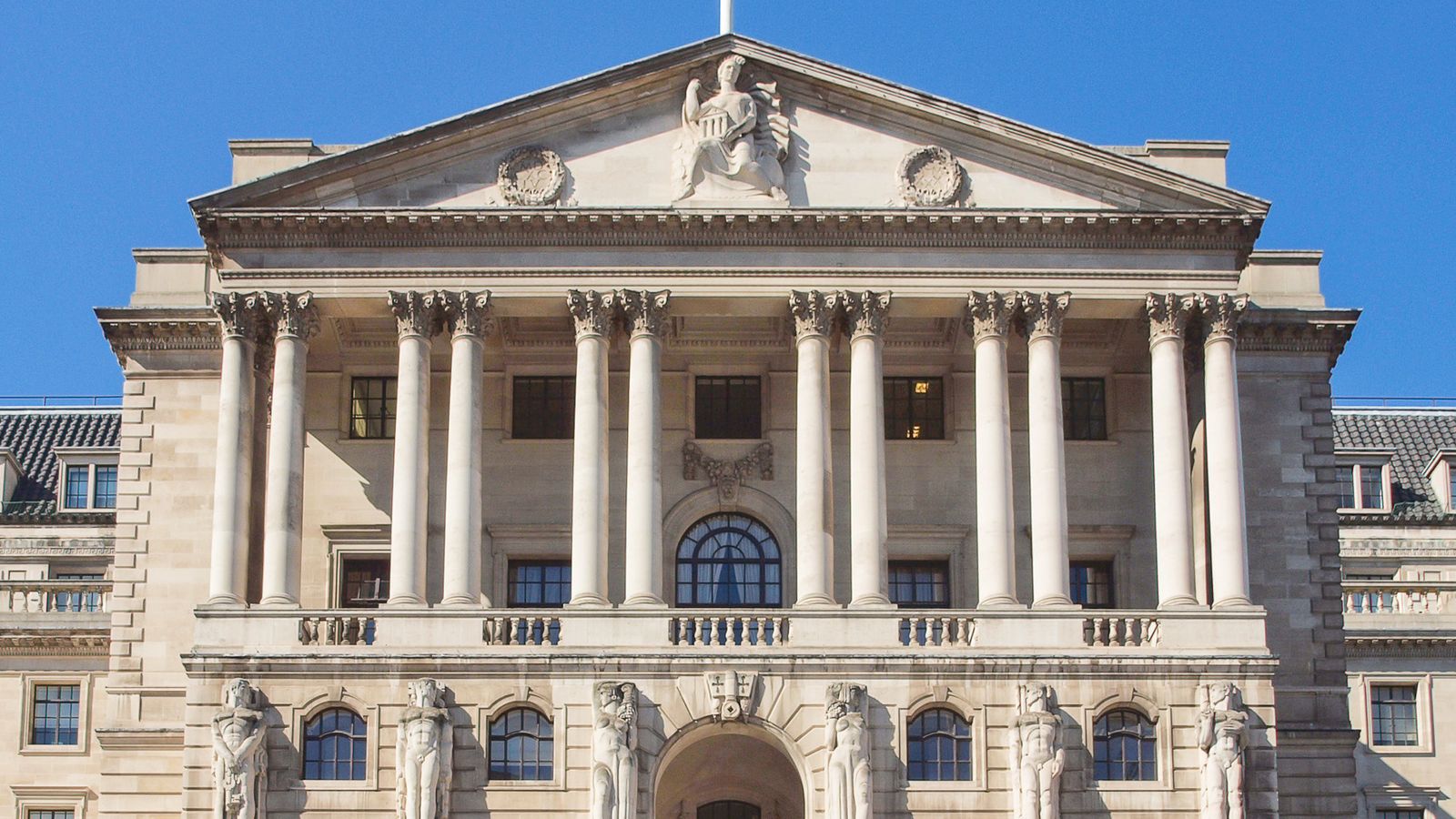Analysis
What on earth is happening in UK markets and why is the Bank of England struggling to address it?
Sky’s economics editor says the way the financial industry is reacting to efforts by the Bank of England’s attempts to stabilise the bond markets is unnerving, and the UK is increasingly turning into an economic laboratory for the epoch we live in.
Ed Conway
Economics & data editor @EdConwaySky
Tuesday 11 October 2022 23:56, UK
The historical building of the Bank of England, London, UK
Why you can trust Sky News
This is starting to look a little… unnerving.
This morning the Bank of England tweaked its emergency intervention into the government bond (gilts) market for a second successive day.
The details are somewhat arcane: yesterday it doubled the amount it was offering to buy each day; today it said it would widen the stock of assets it is offering to buy. But what matters more is the big picture.
The government bond market is – in the UK and elsewhere – best thought of as the bedrock of the financial system.
The government borrows lots of money each year at very long durations and these bonds are bought by all sorts of investors to secure a low but (usually) reliable income over a long period of time.
Compared to other sorts of assets – such as the shares issued by companies or for that matter cryptocurrencies – government bonds are boring. Or at least, they’re supposed to be boring.
They don’t move all that much each day and the yield they offer – the interest rate implied by their prices – is typically much lower than most other asset classes.
MORE ON BANK OF ENGLAND
British Health Secretary Therese Coffey attends Britain's Conservative Party's annual conference in Birmingham, Britain, October 3, 2022. REUTERS/Hannah McKay
Therese Coffey says Britons should ‘be assured’ by UK’s finances – as Bank of England makes second intervention in two days
The Bank of England in the city of London. The pound suffered further falls on Wednesday after the UK Government was heavily criticised by the International Monetary Fund over its handling of economic policy. Picture date: Wednesday September 28, 2022.
Long-dated bond yields rise as Bank of England doubles potential value of daily gilt purchases
The Bank of England
Bank of England official criticises government’s mini budget action – as sidelined OBR creates more ‘uncertainty’
Related Topics:
Bank Of England
But recently the UK bond market (we call them gilts as a matter of tradition, short for gilt-edged securities, because in their earliest embodiment they were pieces of paper with golden edges) has been anything but boring.
In the wake of the mini-budget, the yield on gilts of various different durations leapt higher – much higher. The price of the gilts fell dramatically. That, ultimately, was what the Bank of England was originally responding to a couple of weeks ago.
But to understand what a tricky position it’s in, you need to zoom out even further. For while it’s tempting to blame everything on the government and its mini-budget, it’s fairer to see this as the straw that broke the market’s back. For there are three intersecting issues at play here.
The end of the low interest rate era
The first is that we are in the midst of a seismic economic moment.
For the past decade and a bit, we (here in the UK but also in the US, Eurozone and throughout most of the world) have become used to interest rates being incredibly low.
More than low, they were effectively negative, because in the wake of the financial crisis central banks around the world pumped trillions of dollars into the financial plumbing.
They mostly did so (in this case the method really matters) by buying up vast quantities of government debt. The Bank of England became the single biggest owner of UK gilts, at one point owning roughly a third of the UK’s national debt.
It was an emergency measure designed to prevent a catastrophic rerun of the Great Depression, but the medicine has proven incredibly difficult to wean ourselves off.
A few years ago, when the US Federal Reserve thought out loud about reversing quantitative easing (QE) – as the bond-buying programme is called – it triggered such a panic in bond markets that it immediately thought twice about it.
Since then, it and other central banks like the Bank of England have been as careful as possible not to frighten these markets. They have managed to end QE and, in the case of the Fed, have begun to reverse it. This is a very, very big deal.
Think about it for a moment.
All of a sudden, the world’s biggest buyers of arguably the world’s most important asset class have become big sellers of them.
In the UK, the Bank of England was due to begin its own reversal of QE round about now.
Tensions were, even before the government’s ham-fisted fiscal statement, about as high as they get in this normally-dull corner of financial markets.
Reliance on complex derivatives
The second issue (and this is something only a few financial analysts and residents of the bonds market fully appreciated up until a few weeks ago) is that the era of low interest rates had also driven investors into all sorts of strange strategies in an effort to make a return.
Most notably, some pension funds had begun to rely on complex derivatives to keep earning a decent return each year while complying with regulations.
These so-called Liability Driven Investment strategies were well-suited for the nine-times-out-of-ten when the gilts market was boring. But as interest rates began to rise this year – partly because inflation was rising and central banks were beginning to raise interest rates and reverse QE; partly because investors twigged that the next prime minister seemed quite keen on borrowing more – these strategies began to run into trouble.
They were feeling the strain even before Friday 23 September.
Hard to think of a worse moment for an uncosted fiscal plan
But that brings us to the third of the issues here: the mini-budget.
The government bond market was already, as we’ve established, in a sensitive position.
Markets were, as one adviser to the Truss team warned them, febrile. It is hard to think of many worse moments for a new, untried and untrusted government to introduce uncosted fiscal plans. Yet that is what Kwasi Kwarteng did in his mini-budget.
The problem wasn’t really any single specific policy, but the combination.
It wasn’t about the sums (or lack thereof) but a dramatic loss of credibility for the government.
All of a sudden, the UK, which is anyway very reliant on external funding from overseas investors, seemed to surrender the benefit of the doubt.
Traders began to pull money from the UK, pushing the pound lower and forcing interest rates in the bond market higher (after all, if people are reluctant to lend to you, you have to offer them a higher rate to persuade them).
The new Chancellor seems genuinely to have been completely taken unawares by the reaction to his plan.
Yet the reality is that it so happened (in fiscal terms at least) to be about the worst possible pitch at the worst possible time. And it pushed up interest rates on government debt dramatically.
Read more:
Renewed focus on pension fund investment strategy following Bank of England’s intervention in gilt market
How a pensions technicality threatened to undermine the entire financial system
istock bank of england
Wave of defaults could lead to a total breakdown of system
As I say, this was far from the only thing going on in markets.
On top of all the above, there were and are question marks about whether the Bank of England is acting fast enough to clamp down on inflation.
But these questions, and many others, were effectively swamped by the catastrophic surge in interest rates following the mini-budget.
Catastrophic because the increase in rates was so sharp it threatened the very functioning of the gilts market – this bedrock of the financial system.
And for those liability-driven investors in the pensions sector, it threatened to cause a wave of defaults which could, the Bank of England feared, lead to a total breakdown of the system within days or even hours.
This fear of what it called a “run dynamic” – a kind of wholesale equivalent to what we saw with Northern Rock, where a firesale of assets causes values to spiral ever downwards – sparked it into action.
It intervened the Wednesday after the mini-budget, offering to buy £65bn worth of the longer-dated gilts most affected. The intervention, it said, was taken to prevent the financial system from coming to harm.
But the method of intervention was quite significant.
After all, wasn’t buying bonds (with printed money) precisely what the Bank had been doing for the past decade or so through its QE programme?
Well in one sense… yes. The Bank insisted this was different: that this was not about injecting cash into the economy to get it moving but to deal forensically with a specific issue gumming up the markets. Financial stability, not monetary policy.
Even so, the paradox is still hard to escape. All of a sudden the Bank has gone from promising to sell a bucket load of bonds to promising to buy them.
Market reaction
The initial market reaction was overwhelmingly encouraging: the pound rose and interest rates on government bonds fell.
It was precisely what the Bank would have wanted – and most encouragingly it seemed to be driven not by the amount of cash the Bank was putting in (actually surprisingly few investors took up its offer to buy bonds), but sentiment.
The vicious circle precipitated by the mini-budget seemed to be turning around.
But in the past few days of trading, things have unravelled again.
The pound has fallen; the yields on bonds have risen, back more or less to where they were shortly before the Bank intervened a couple of weeks ago. It is unnerving.
And this brings us back to where we started. The Bank has bolstered its intervention a couple of times but it hasn’t brought yields down all that much – indeed, quite the contrary.
As of this lunchtime Tuesday the yields on long-dated UK government bonds were even higher than they were 24 hours earlier.
Why? One obvious issue is that the Bank’s intervention is strictly time-limited. It is due to expire at the end of this week. That raises a few other questions. First, will the pension funds reliant on those liability driven investments have untangled themselves by then? No-one is entirely sure. For a sense of how worried investors are about this, just look at what happened to the pound tonight after the Bank’s governor, Andrew Bailey, insisted the emergency programme will indeed end on Friday. It plummeted off a cliff-edge, instantly losing almost two cents against the dollar.
Second, will the government have become more credible in the market’s eyes by then? Almost certainly not. Aside from anything else, it isn’t due to present its plans for dealing with the public finances until the end of this month.
Third, what does all this mean for monetary policy and the end of QE? If we are to take them at their word, after ending this scheme the Bank will shortly begin the process of selling off bonds all over again.
So, one day they’re gearing up to be a massive seller; the next a massive buyer; the next a massive seller all over again.
Little matter that the stated reasons for the bond buying/selling are different. From the market’s perspective, no one is quite sure where they stand anymore.
In this final sense, the UK has unwittingly turned itself into a kind of laboratory for the epoch we’re in right now.
Everyone was expecting bumps in the road as the era of easy monetary policy came to an end.
It seems we are currently experiencing some of those bumps. And it just so happened that, thanks in large part to its new government, the UK found itself careering towards those bumps rather than braking before hitting them.






























